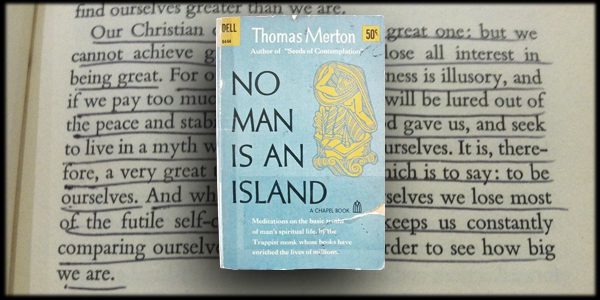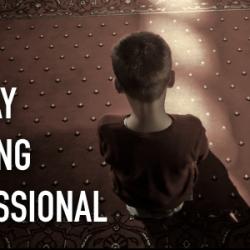 No Man is An Island is slowly becoming my favorite among the many writings of Thomas Merton. This book is a deep well. Today I was reading from Chapter 5, “The Word of the Cross,” in which Merton explores the role pain and suffering plays in human life. This is a quick summary of what Merton is teaching me today. Some of these are Merton’s thoughts, and some of them are mine as Merton prompted reflection. To tell the difference, you will have to read the chapter, which is what I want you to do anyway.
No Man is An Island is slowly becoming my favorite among the many writings of Thomas Merton. This book is a deep well. Today I was reading from Chapter 5, “The Word of the Cross,” in which Merton explores the role pain and suffering plays in human life. This is a quick summary of what Merton is teaching me today. Some of these are Merton’s thoughts, and some of them are mine as Merton prompted reflection. To tell the difference, you will have to read the chapter, which is what I want you to do anyway.
- Don’t try to make sense of pain apart from cross and resurrection. It simply can’t be done.
- The Christian task is not to accept suffering as an inevitable part of life, but to redeem suffering, and this can only be done in relationship to God. The enduring of pain and suffering must become an aspect of our relationship to God.
- The first thing that pain does is it isolates us from other people. Pain has an intensifying effect. It focuses our attention. We can’t be bothered by trivialities or banal attachments when we are in pain. Because it demands our full attention, pain makes us appear “dumb” to the outside world, even to ourselves.
- When pain asks, “who are you?” About the best we can do is state our name, and admit the pattern our lives have assumed over time. Pain is truth serum.
- Don’t try to make sense of pain apart from baptism, and the conviction that pain is only made intelligible if, by enduring it in constant reference to Christ, we are joined to Christ as our lives take on the pattern of his life–the pattern of our baptism.
- Pain is intensely personal, and is one of the main points of personal connection between our lives and Christ’s life. Sharing pain is a more complex, higher level skill. The first level of endurance drives us inward. The trick is to allow Christ to be the focus of that drive inward.
- To know suffering without any faith in the redemption of our pain is to know what it means to be cursed. We can only do this to ourselves.
- The second thing suffering does is drive us to each other. If we cannot share our pain with other people, eventually our pain becomes futile and it will destroy us. Suffering is wasted when we suffer alone, but to share our pain with others in a healthy way is a difficult skill to master.
- If the byproduct of endurance is pride, then our suffering has been a waste.
- If we have met Christ in our suffering, we will have had the experience of knowing that we are deeply loved.
- Pain is not God’s chosen route to wisdom, it is our chosen route. God redeems pain because God is good like that.
- The effect suffering has on our life will depend chiefly upon our answer to one central question: what do we love? Self? Others? God? If the answer is self, pain will wreck us. If the answer is others, we can remain on the path to redemption. If the answer is God (and others for God’s sake), then we can experience shalom, peace, the right ordering of all of life even in the midst of suffering.
- It is impossible for our suffering to be consecrated to God apart from our immersion in the life of the church. To suffer in isolation is to choose torture. The problem is that it’s humiliating to expose our deficiencies to the community.
- Suffering becomes useless and destructive when it turns in on itself. When it fills us with selfishness, fear, and hatred, pain can destroy our soul.
- Most suffering has to happen in silence. To talk about it too much sentimentalizes our pain and robs it of its potency. It’s possible to share in each other’s suffering without saying a word. Perhaps the primary impetus for the sharing of suffering is liturgy.
- If we can see our pain and own it without advertising it or drawing attention to it; If we can endure our pain in silence, sharing it only in the midst of the sacramental community, then we will become resigned to the fact that at some point our suffering & pain will make us a burden to those who love us.
- The last thing suffering does is produce in us a kind of gratitude that results in hope. We are grateful to join in the shape of the cross, because we know it will result in the eventual resurrection, too. To suffer well we must continually remind ourselves of the suffering of Christ. Even the one who believes nothing about God or Christ can be helped through suffering by the meditation on the sufferings of Christ. Perhaps this is why this theme remains so prevalent in art.













